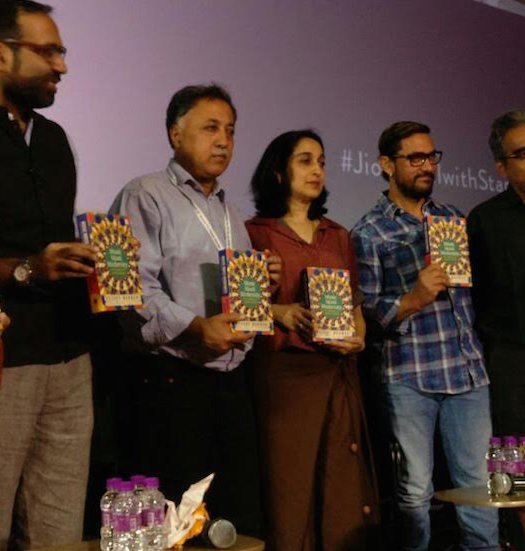In the movie industry, it’s just a question of timing
Filmmaker Navdeep Singh known for films like Manorama Six Feet Under and the more recent NH10 is among the esteemed mentors chosen for the first Mumbai Mantra – Cinerise Screenwriting Programme. In a chat with Pandolin at the inauguration of the Programme, Navdeep talks about the importance of screenplays, his views on the Lab, his latest release and more.

Navdeep Singh
What according to you is the difference between screenplay, script and editing? And how important are the three in a film?
Personally there is no difference in script and screenplay for me. I feel that in our industry, screenplay is an expanded version of a script. A film is written three times during the screenplay, then shoot and then edit. Each one of them is equally important as you are getting a chance to retell the story all over again. But I feel screenplay is the most important as it’s the house you are building. And it’s heartening to see that they are taking an initiative to help develop the art and craft of screenplay, which in the last few years has been ignored in India.
READ: ELEMENTARY GUIDE TO SCREENPLAY WRITING
There are a lot of labs that are happening in the country, why is this lab any different than the others?
Honestly, I don’t know much about the other labs as I have not been invited. I have done one-day workshops with students at FTII, NID and Whistling Woods. Personally for me, I enjoy interacting with young talent. It’s great to hear un-jaded voices when the industry is surrounded by jaded voices. It’s great to see young talented people thinking out of the box. This formula is great because it’ll be an interaction between people who are in the industry and people who are on the fringes or the outside, where people can share their ideas and not just mentors giving whatever they have to say.
There are a lot of stories in India that are made every year. A lot of them work, a lot of them don’t. Why do you think some stories resonate better than others with the audience?
The audience is unpredictable. Some very bad films work, some very good films don’t work. Sometimes some good films work and the bad films don’t work. I think in the movie industry they say nobody knows anything and it’s very true. It’s just a question of timing.
How do you plan on helping these ten scriptwriters?
Every opinion on every script or story is subjective. My intent is to share from my experiences of storytelling and try and help them in whatever way possible.
There was a lot of gap between your last film and NH10. Are you taking your time?
No I am not. There were a couple of movies that were started and stopped. So it’s a tragic story, maybe someday I’ll make a story on that “dukhbari” story.
NH10 was a critically acclaimed film that gave the audience goosebumps. Do you have similar stories in mind for the future?
Not on the lines of NH10. But yes, I like to think that stories should have a certain amount of layering to them where you can enjoy and word in quotes. I don’t think NH10 in that sense was an enjoyable film. But yes, at least you can read a story at various levels and not just the superficial level but dig for some subtext.
Word has it that the makers of NH10 are planning on making a sequel of the film. Have you been approached for it?
Very honestly I haven’t been approached (laughs). So you’ll have to talk to the producers about it.
Script writing labs are a very international concept but are picking up in India. How important will it be to have a really good story even if someone comes from a completely different, non-film background? And how much importance do these labs hold for you?
It’s a difficult one to answer but I’ll give you my own experience. For about a year and a half, Vikram Motwane, Akshat Verma, Abhishek Choube, myself and a couple of writers used to run this informal weekly Sunday session where we would meet up with writers, read their scripts and give them feedback. It’s because a lot of us in the industry feel that there’s not enough attention given to writing. A lot of young writers don’t get the correct guidance. Having a story itself is just the beginning of the process. Then you take that story, divide it up into scenes, see what is structurally coherent, and satisfying at the end. It’s something that comes out of doing the same thing again and again, getting feedbacks and being able to develop your craft. Any craft is about experience and putting hours of practice to it. That’s where the labs are really important, where known voices give constructive feedback and constructive criticism to young aspiring writers.
READ: WE’VE NEVER ATTEMPTED ANYTHING LIKE ‘THE SWEET REQUIEM’ BEFORE
How naturally do the characters come to you when you are writing a script?
It depends from person to person. Some people start with the character in mind. They develop a strong character and build a story around it seeing where the story goes. Some people go backwards and have a plot. They try and figure out who the best characters would be to suit the plot.
Personally for me, I enjoy characters. For me that’s a very important part of the story because different characters would respond differently to the same scene and that’s the thing actors get drawn to. Someone in Hollywood had once said “Screenplay are actor baits”. It’s ultimately attracting an actor to a character. It’s one of the ways to get a film made.
– Shivangi Lahoty



